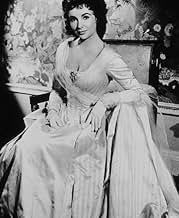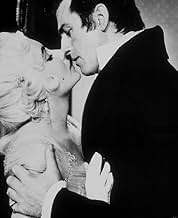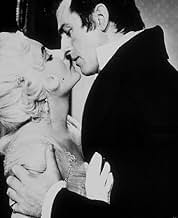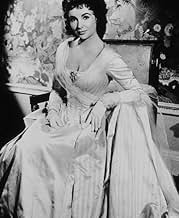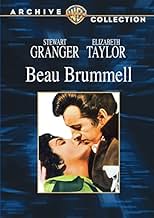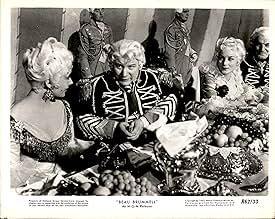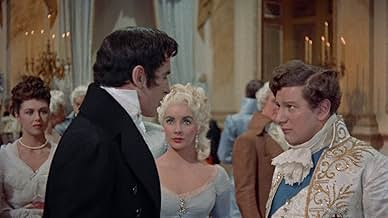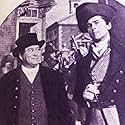Ajouter une intrigue dans votre langueIn 1796, Captain George Bryan "Beau" Brummell of the 10th Royal Hussars Regiment offends the Prince of Wales with his straightforward outspokenness and gets fired from the Army but is chosen... Tout lireIn 1796, Captain George Bryan "Beau" Brummell of the 10th Royal Hussars Regiment offends the Prince of Wales with his straightforward outspokenness and gets fired from the Army but is chosen as the Prince's personal advisor.In 1796, Captain George Bryan "Beau" Brummell of the 10th Royal Hussars Regiment offends the Prince of Wales with his straightforward outspokenness and gets fired from the Army but is chosen as the Prince's personal advisor.
- Director
- Writers
- Stars
Avis en vedette
Hollywood was determined that he was at the center of the films. At his best (KING SOLOMON'S MINES, YOUNG BESS, SCARAMOUCHE) he was given good material, and good direction, and some humor (in SCARAMOUCHE anyway). But he was soon straight jacketed into costume films no matter how weak they were. Granger did occasionally break away from sword and leotard flicks, like ALL THE BROTHERS WERE VALLIANT and THE LAST HUNT and (a little later) NORTH TO ALASKA - a welcome comic part. But most of his Hollywood films were like BEAU BRUMMEL and FOOTSTEPS IN THE FOG: Weak stories with Granger pushed into British historical costumes.
BEAU BRUMMEL had been a play written at the turn of the century by America's leading dramatist of the day, Clyde Fitch. Forgotten (somewhat unjustly today), Fitch was usually a social comedy writer. His best known comic play (not revived for many decades) was a vehicle for a young actress named Ethel Barrymore called CAPTAIN JINKS OF THE HORSE MARINES. After watching Barrymore pursue the actor portraying Captain Adolphus Jinks (yes, that's his name) for two and a half hours, the play was so successful that Ethel added a line at the end to still the demands for encores: "That's all there is, there isn't anymore." Ironically, due to savage critics like Brooks Atkinson, Fitch's plays are rarely staged, so that final line is better remembered than it's play.
A number of years back (about 1986 or so) a group of female actors put together a review, called "The Club" (I believe that was the name). They were dressed in turn of the century clothing as male members of a club. Part of the review was a one act play of Fitch's. The critics felt it was quite well acted and even entertaining.
Fitch was known for historical dramas as well. He wrote one on NATHAN HALE. He also wrote this play, BEAU BRUMMEL, for Richard Mansfield. It is actually a study in a dandy's fall from "greatness" or social fame into tragedy. The real Brummell was to lose his social position, his fortune, his friendship with George, Prince of Wales ("Prinny" or "Florizel" - later George IV), and finally his sanity. The original play was grim. For an actor like Mansfield, who reveled in roles that emphasized opposites (the original "Dr. Jeckyll and Mr. Hyde") he must have enjoyed going from plushy costumes to rags. The 1924 film version with John Barrymore as Brummel is closer to the original.
Brummel was a leader of social fashion. One of the Regency figures (including his "fat friend" the Prince) who created the style known as "Regency" that is for the period of 1795 to 1837. He influenced the Prince about wardrobe and social behavior - so much that George was called "The First Gentleman of Europe". But he had no political influence. He probably had no political ideas of importance at all.
The film tries to make him more important historically than he was. He was a fop who briefly influenced culture - but he did not confront William Pitt the Younger as this film suggests. In fact Prince George was not the best person to try to influence politically at all. Although in his youth he was frequently seen with Whig figures like Charles Fox (Peter Bull in the film) or Richard Sheridan, this was to spite his Tory father George III (Robert Morley in this film). If you saw that better historical film, THE MADNESS OF KING GEORGE III, the poisonous relationship of the King and his heir was shown quite well. As Prince George grew older, his basic conservatism grew. By the time he was acting Prince Regent and then King (1811 - 1820; 1820 - 1830) he was firmly in the Tory ranks. But Pitt the Younger was dead by then.
As mentioned in another comment on this thread, Morley as the mad King, and Ustinov as the Prince (later King) were the best performers in this film. Poor Granger tries, but he has a terrible script to work with. They should have kept to the original - it might have been worth while as a film. For the sake of Ustinov and Morley I am giving this film a 6 out of 10.
Beau Brummell is a biopic, about the love-hate friendship between the title character and the Prince of Wales, played by Stewart Granger and Peter Ustinov, respectively. It gets a little wordy, since it was based off a play, but those who like lots of beautiful sets and costumes to look at will be sufficiently distracted. The distraction for everyone will be Elizabeth Taylor, and she sparkles in the few romantic scenes she's given.
It's not a fantastic movie, but it won't hurt you to watch it, if you like historical movies, or the 1800s in particular. If you're not fully invested though, it might get a little boring.
The film is far from being historically accurate, especially as regards chronology. The events depicted here (the Regency Crisis of 1788, the Prince's marriage to Caroline of Brunswick, Brummell's rise in the Prince's favour, his fall from grace, the death of King George III in 1820 and Brummel's own death in 1840) historically cover a period in excess of fifty years, but here they are presented as occurring over a much shorter timescale. Rather oddly, the villain of the piece is William Pitt the Younger, widely regarded as one of Britain's greatest Prime Ministers but presented here as a cunning, power-hungry schemer who refuses to allow King George III to be certified as mad (although he quite obviously is) in order to protect his own power. (The relationship between Pitt and the King depicted here more closely resembles that between the Austrian Chancellor Prince Metternich and the feeble-minded Emperor Ferdinand I who, for political reasons, was never declared to be insane). In reality Pitt died in 1806, but here he is shown as outliving not only George III but also Brummell.
The film's politics are, in fact, rather inconsistent. Early on, Brummell, whose family although wealthy are of fairly humble stock, is portrayed as something of a radical filled with the spirit of the French Revolution and complaining about the class divisions within British society. Later on, however, he becomes as the Prince's friend an arch-reactionary, encouraging the future George IV to defy Parliament and to rule more as an autocrat than as a constitutional monarch. Brummell's justification for this apparent change of heart is that he feels that the Prince will make an admirably liberal ruler, far more liberal than Pitt, but the character played by Peter Ustinov does not really make us feel that this confidence is well-founded.
Stewart Granger was known for playing dashing heroes in costume dramas, so was well-suited to the lead role, although it contains less in the way of physical action than some of his other parts from this period. Ustinov gives a good comic performance as the petulant, self-pitying Prince, and Robert Morley a more serious one as the mad old King. I was, however, surprised to see Elizabeth Taylor, already a major star in her early twenties, in a comparatively minor role. She plays Brummell's love-interest Lady Patricia Belham, although he eventually loses her to another man. Apparently Lady Patricia, a fictitious character not found in the play on which the screenplay was based, was inserted to allay any suspicions on the part of the ultra-puritanical American censors that the friendship between Brummell and the Prince might be homosexual in nature.
"Beau Brummell" is not the sort of film which is likely to please the historian, but then it was never intended to. It was clearly intended as an enjoyable period romp and, to some extent, still works on that level. 6/10
Le saviez-vous
- AnecdotesThis movie had troubles with the U.S. censor, the Production Code Administration, because of the apparent justification of the immoral relationship between the Prince of Wales, played by Sir Peter Ustinov, and Mrs. Fitzherbert, played by Rosemary Harris, because a steward at a gentlemen's club had the manner of a "sex pervert", because the Prince checks the gender of a dog, and because of the use of the word "damn". Changes were made, but the running time remained the same.
- GaffesThe final meeting between a dying Brummell and George IV is fiction, as the King declined the meeting and Brummell was not on his deathbed at the time. He outlived George IV by ten years.
- Citations
Beau Brummell: [to Patricia] Please stay. We want each other. Think of the story you can tell our grandchildren.
- ConnexionsFeatured in Elizabeth Taylor - An Intimate Portrait (1975)
- Bandes originalesMilanollo
(uncredited)
Music by Johann Valentin Hamm
Meilleurs choix
- How long is Beau Brummell?Propulsé par Alexa
Détails
- Date de sortie
- Pays d’origine
- Langue
- Aussi connu sous le nom de
- The Life and Times of Beau Brummell
- Lieux de tournage
- société de production
- Consultez plus de crédits d'entreprise sur IMDbPro
Box-office
- Budget
- 1 762 000 $ US (estimation)
- Durée
- 1h 53m(113 min)
- Couleur


